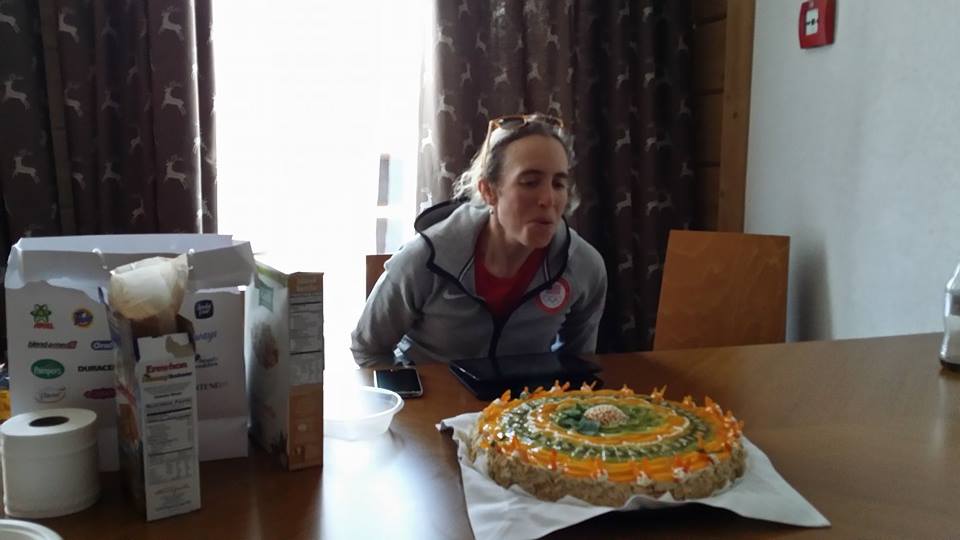
FasterSkier’s coverage is made possible through the generous support of Rudy Project.
SOCHI, Russia – When Megan Imrie woke up on Friday, she might have felt something a little special.
After all, it was her birthday! At a certain point, birthdays lose a bit of their luster, but Imrie was turning 28. It was a cause to celebrate.
There was just one hitch: the Canadian is a biathlete competing at the Olympic Games. That evening, she had to toe the line in a 15 k individual competition.
“It’s a tough one,” she said.
As such, there couldn’t be too crazy of a party, either before or after the race. After all, Imrie likely has two more starts left at the Games. (Canada has not named their mixed relay team yet, but Imrie has a shot at being on it, and will definitely participate in the women’s relay.
“We’ll just have a team party tonight,” she said at the finish of the 15 k, where she placed 30th. “It’ll be fun tonight. I don’t know what we’ll be up to, but something. Maybe a good round of Cranium or something. Live on the wild side.”
American biathlete Susan Dunklee turned 28 just one day before Imrie.
“It’s hard to have your birthday on the road,” U.S. biathlete Sara Studebaker said of her teammate. “For her, she has to race the next day, so you can’t really do anything.”
And so it goes. The Olympics are great for a lot of things. But parties? Not so much, unless you’re done competing. That may be especially true for cross-country skiers and biathletes this year, as they are staying in a separate athletes’ village that is isolated from all the other sports, where they might find kindred partiers. In the endurance village, everyone is preparing for grueling races for the entire course of the Games.
“Really, I think her birthday party will wait until after the end of the Olympics, and then we’ll be able to really celebrate,” teammate Hannah Dreissigacker said of Dunklee. “It wasn’t a great day to really celebrate too much.”
Still, though, the athletes found small ways to make the day special.
“I came in this morning and last night, the girls had decorated the living room,” Imrie said. “They had taken my race suit and put balloons in it and stood it up on ski boots, and tied it to a hat. They made it a face, and there were streamers everywhere. It was like a mannequin of, well, me.”
Several people had coordinated to find something a little special to spice up Dunklee’s day, which turned into a small party in the athletes’ village.
“My teammates found a cake for me,” she said after placing 34th in the 15 k. “I don’t know where they got it from, but they surprised me with it. And my parents came and visited. So it was pretty low key but a fun little hang out.”
A few cross country skiers came over from the house next door. How is that not a party?
If you’re a ski racer born in February like Imrie and Dunklee, chances are you’ve raced on your birthday at least a few times. Dunklee said it as nice to have a day off this time around; last year she raced, also in a 15 k individual, where she placed 15th.
“I’ve had to race on my birthday numerous times growing up and even last year at World Championships,” Dunklee said. “Sometimes it’s really special, but sometimes it’s nice to have a low-key day.”
The culprit behind the cake was Tracy Lamb, a former biathlon coach who is a U.S. Olympic Committee liaison in the endurance village. It was special, said Dreissigacker, but probably unlike any birthday cake Dunklee had eaten before.
“It actually looked really good,” Dreissigacker said. “I couldn’t eat it because I’m gluten-free, but it was really dense and almond-y, and then the whole top was covered in fruit. Like, intensely covered in little slices of kiwi and stuff. It was beautiful! It was very, not a normal American birthday cake.”
Did the small celebration give Dunklee a little pick-me-up? Yes, to some extent.
That’s what Canadian skier Perianne Jones can look forward to two days from now when she turns 29, the day before the team sprint that has been a focus for the Canadian team.
But the last thing about birthdays at the Olympics is that they help everyone else out, too.
“It helps,” Dunklee’s teammate Sara Studebaker said. “We’re here for so long, and we’re doing so much racing, and it’s pretty stressful. Any time you can have something like, ‘oh, this is totally unrelated to sport! Let’s go do that! Let’s think about that for a while!’ That’s good. That’s really nice.”
Chelsea Little
Chelsea Little is FasterSkier's Editor-At-Large. A former racer at Ford Sayre, Dartmouth College and the Craftsbury Green Racing Project, she is a PhD candidate in aquatic ecology in the @Altermatt_lab at Eawag, the Swiss Federal Institute of Aquatic Science and Technology in Zurich, Switzerland. You can follow her on twitter @ChelskiLittle.



